B AND G LOCK AND TOOL CO. LTD. CHAPEL GREEN, WILLENHALL.
JAMES BAILEY AND CO. LTD. CROWN MILLS, WOLVERHAMPTON STREET, WALSALL
Manufacturers of locks for travel goods. Existing in 1953 but not in
1970.
H. G. BAKER, 173 WALSALL ROAD,
WILLENHALL
|

|
Founded by Henry George Baker who was a
diesinker by trade.
|
It is said that he would deliver tools to Birmingham, on the bus, with them
attached to a piece of string which he would put around his neck for
ease of carriage. When he married, his parents in law would not allow
him to expand the business that was being run from their premises,
because of the noise of the drop stamps. At this point he decided to go
into the manufacture of locks and possibly made padlocks and mortice
locks.
When Herbert Baker died he passed the business to his
daughter who ran it with her husband, Aubrey Smith. They specialised in
the manufacture of locks for metal cabinets and pit head bath lockers.
Aubrey Smith died sometime after 1976 and his sons Colin
and Howard ran the business, although the mother,
Mrs M. P. Smith, was
still listed as the proprietor. Closed in 1995 due to lack of business.
SAMUEL BAKER, MOAT FIELD WORKS, WILLENHALL
(c1850-1950)
Manufactures of japanned, galvanised and brass pad
locks.
Samuel Baker started in a brewhouse in Back Lane,
Willenhall. (Back Lane is now Cemetery Road.) The earliest
record of them is in Kelly’s Directory of 1850. In the PO
Directory of 1876 they are listed as Iron Padlock makers at 13 Union
Street. They moved to Moat Field Works, Moat Street in 1880.

In the 1881 census Samuel Baker, age 29, was running
the business. This would probably be the son of the founder.
He was unmarried and lived at 6 Stafford Street,
Willenhall. He employed 12 men and 6 boys. Samuel died in 1930
After his death Mrs Baker, his widow, Mr Prothero, and
the two sons, Harold and Roland, ran the works. The business was sold to Century Locks (q.v.) in 1950
and the name ceased to exist. (Ref. LMNL 26)
| This billhead (left) (kindly supplied by Trevor
Dowson) is apparently from 1890 (but the telephone number is 22503,
which seems a bit long for that date).
The telegraphic address
is "Scarboro" and the telegraphic address is "Protheroe". Are
these names significant? |
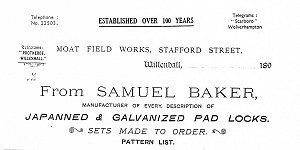 |
|
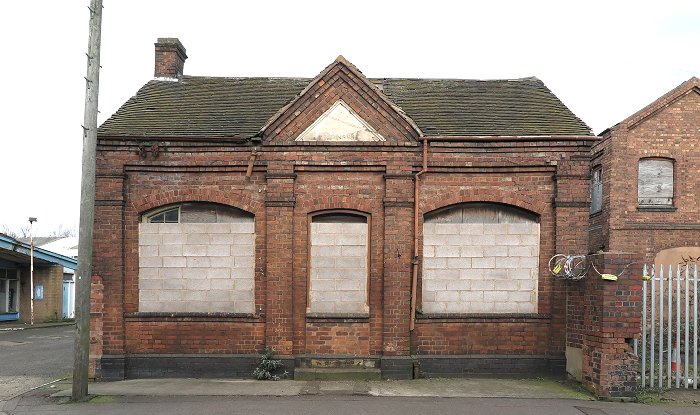
A sad looking Moat Field Works, as
seen in March 2015. |
|
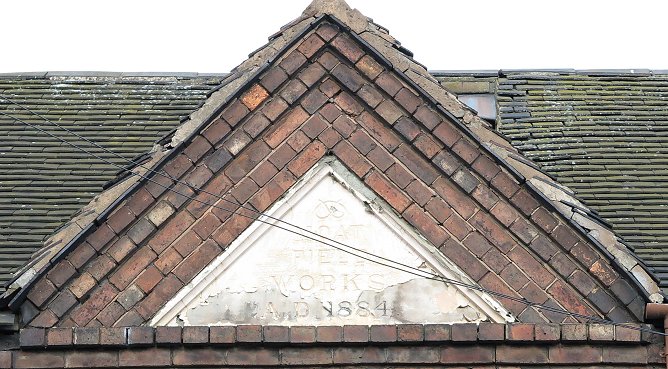
The panel carrying the works' name and
building year, 1884. |
|
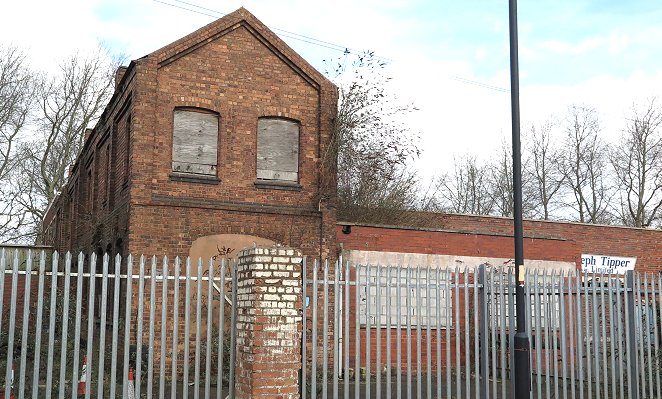
The other part of Moat Works, as seen
in March 2015. |
B.H.B.M. LOCK CO. LTD. 84 ST ANN’S ROAD,
WILLENHALL
Mortice lock rim locks makers. No reference in 1914 or
1970. Existing in 1953. Nothing else known.
BANHAM PATENT LOCKS LTD. 233 KENSINGTON HIGH STREET,
LONDON
BANKS AND RUSHTON LTD. WOOD STREET, WILLENHALL
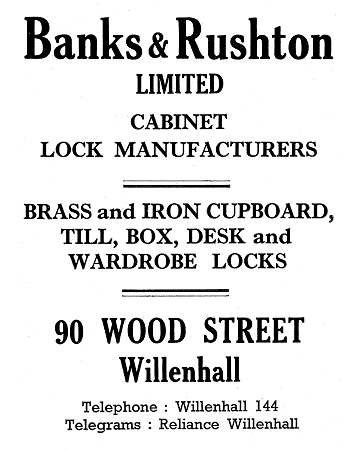 |
In existence in 1921 at Cemetery Road. Makers of brass
cabinet locks.
In the 1950s were taken over by W. M. Pinson (qv). Still in
business in 1970. Nothing else known.
The advert on the left is from 1954. |
BANKS BROTHERS, ROOKERY STREET, WEDNESFIELD.
Cabinet lock makers.
Kelly’s 1900:
Thomas Banks, Rookery Street ,Wednesfield,
Lockmaker.
Mrs Isaac Banks, Hickman Street, Wednesfield, Cabinet Lockmakers.
J Banks, Hickman Street, Wednesfield, Key maker
In 1936 Samuel Banks was at Rookery Street, Wednesfield.
No reference in 1921 or 1970. Nothing else known.
J. BANKS AND CO. LTD. EXCELSIOR WORKS, 71 WOOD STREET,
WILLENHALL
This company was founded in 1846 (Information from
Horace Banks said company founded in 1867; but the current company
brochure says established in 1846) by Jacob Horace Banks on the site
of the present works in Wood Street, making padlocks. Kelly’s Directory
of 1900 lists Jacob Banks, 34 Union Street, as Padlock makers. (There is
a sketch in the Willenhall Lock Museum showing his original sketch for
some padlocks in 1906).
|
Jacob had two sons John and Horace (1). John set
up on his own, making night latches, in premises in Wood Street next to
Josiah Parkes' main offices; while Horace (1) joined his father making
padlocks. At a later date John joined Horace (1) in the original
Wood Street premises and set up J. Banks and Co. Ltd. In 1912,
during the 1914-18 war the company manufactured a metal mesh bulletproof
vest that was offered for sale to soldiers.
John’s son Horace (2)
could remember as an 8 year old lad standing outside the Molineux
football ground at Wolverhampton distributing leaflets about the vests.
(The Willenhall Historical Society have a sample of the vest and some
advertising literature that was presented to the by Horace (2)).
John lived in a house on the site of the works. In
1920 a fire burned down the works, and John’s son Horace (2) could
remember being carried down stairs and away from the fire by his father.
He then had to call the fire brigade, who had to go and catch the horse
in a local field to pull the fire appliance before they could deal with
the fire. The works were extensively damaged and were rebuilt as they
stand today.
|
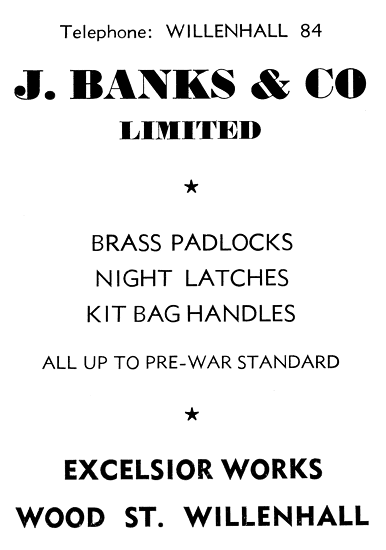
An advert from 1954. |
During the 1939-45 war the company started to
manufacture two types of kit bag handles for the Army and Navy. They
still produce them in 2001 as well as button sticks and equipment
cleaners.
|
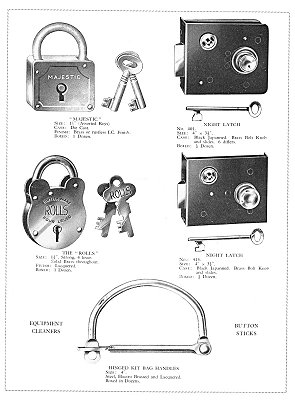
|
At the end of the war they returned to manufacturing an
extensive range of padlocks (Trade names included CAMEO, CONSUL,
MAJESTIC) and night latches (pin key type not pin tumbler). In 1946 John
Banks added a new padlock to the range known as a ROLLS (i.e. the Rolls
Royce of padlocks). It was manufactured to a very high standard.
The lock had very close gating on the levers that made it difficult to
make, so production only continued until the early 1950s.
On the death of John and Horace (1), Horace’s (1) son,
Tony, ran the business from the late 1950s. (Tony was a Bevan Boy at
Hilton Main Colliery from 1945 to 1948). By this time they were
manufacturing locks that were fitted to leather cases used in the coal
mining industry for carrying detonators and explosives. This business
declined with the demise of the British coal industry in 1991.
|
|
John’s son Horace (2) became a toolmaker, eventually
becoming a partner in Orwill Engineering. (Horace died 26 March 1996)
Tony retired and sold the business, on the 7 December
1991, to David Wellman and his partners, Mr. and Mrs. Hipkin, under whose
guidance they have diversified into cast ware products, door and window
fittings to bespoke and "in house" designs, while still continuing to
supply padlocks, budget locks and various locking devices.
Note-this section of the Banks family was not related to
any other lock making Banks of Willenhall.
(Information supplied by Horace Banks, Tony Banks and
David Wellman).
|
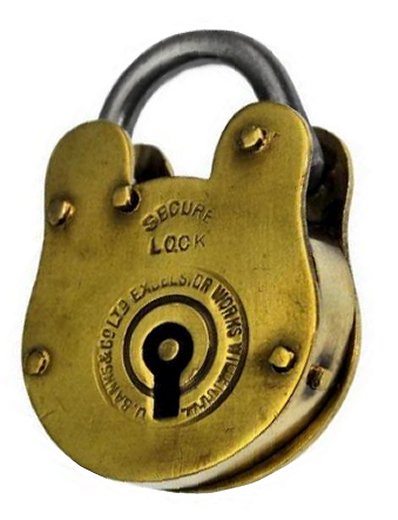 |
JAMES BANKS, ROTUNDA WORKS, WOOD STREET,
WILLENHALL (1864-1971)
Founded in 1864 to manufacturer locks and latches.
In premises in Cemetery Road, next to the railway line. They later moved
to Rotunda Works.
In 1934 Fred Birch worked there for two years running
errands. They made rim, gate and galley locks. Abraham Banks, who
was on old man at that time, ran it; his three sons, Abraham, George and
Enoch, followed him.
Pre WW2 they employed 18 people - this was about the
maximum.
In 1971 Enoch, then age 75, the last Mr Banks, retired
and sold the business. It was incorporated into the Quality Lock Company
(q.v.) in the same premises.
JONAH BANKS AND SONS, LONDON WORKS, CLOTHIER
STREET, WILLENHALL (c1790-1993)
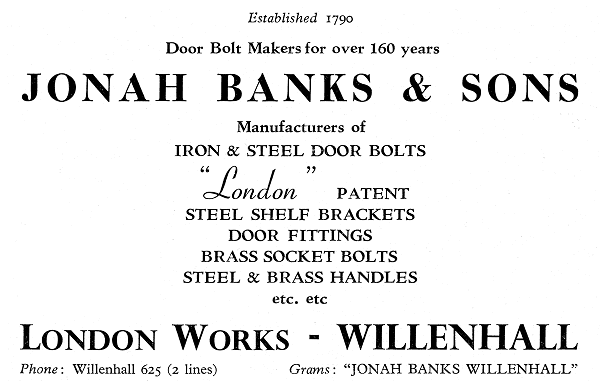 |
An advert from 1954. |
Manufacturers of door bolts, door handles, gate catches
etc., but not known to have made keyed locks. Founded about 1790 by the Banks family, who had come to
Willenhall from Great Wyrley. In the late 18th century had begun
making door bolts in premises in Clothier Street. Jonah Banks was the grandson of the founder and it was
from him that the company got its name.
They continued to make door bolts and added many items
of builder hardware to their range. The firm merged with Abraham
Thompson (qv) in 1912. The receivers were called in on the 5 January
1993; the factory closed down and was demolished shortly afterwards.
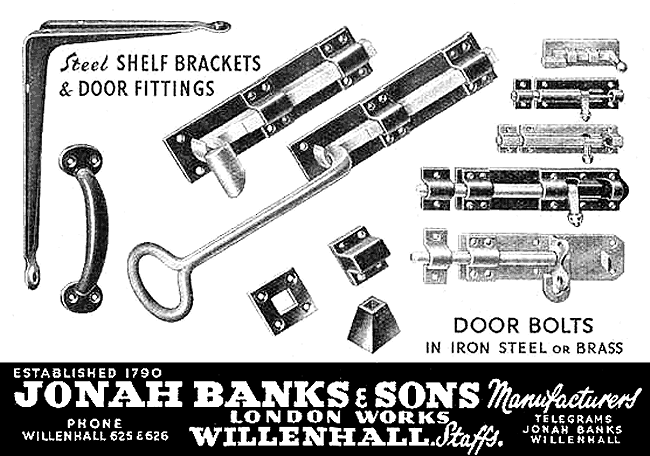
An advert from 1953.
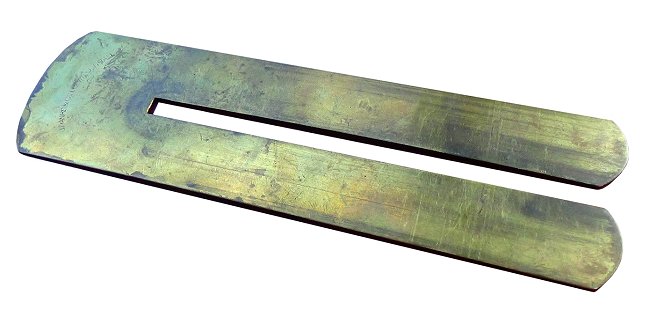
A Jonah Banks button polisher.
T. BANKS, WARD STREET, WILLENHALL.
A father and son business that specialised in key
cutting for master and differ work for lock makers.
In 1936 there was a T Banks at 82 Bloxwich Road.
Started ??? closed c1980s.
Tom Junior went into making turned parts for the oil
industry. Employed up to 15 people and had 3 reps on the road. He sold
the Ward Street premises in 1995 to Keith Carrier who worked as a
locksmith, repairing and fitting locks? Tom Jnr then moved into
premises in Croft Yard. He got into financial difficulties and went back
to cutting keys as an addition to the business. Moved from Croft
Yard to Stringers Lane in 2000.
THOMAS BANKS, BLOXWICH ROAD, NORTH
WILLENHALL
Tommy Banks ran a one-man key cutting business from the
outhouse behind his home in Bloxwich Road North. He would buy blanks
or have them supplied by lockmakers to cut for master and differ work.
He would also deal in anything that would earn him a few pounds. He
gave Horace Evans a brass paper knife that he was trying to sell that he had
obtained from a brass foundry. The knife, engraved "Cockington", is
still used by Jim Evans in 2001.
FREDERICK BARKER (WOLVERHAMPTON) LTD. LEVER
STREET, WOLVERHAMPTON
Lock maker. Started between 1914 and 1921. In 1970 at
Frederick Street, Wolverhampton. Nothing else known.
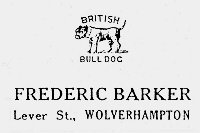 |
The words above are Jim Evans' original entry in this
Gazetteer. But Trevor Dowson has now found these two
images in a 1928 catalogue. This image sows that the
firm was using the British Bulldog trade mark. |
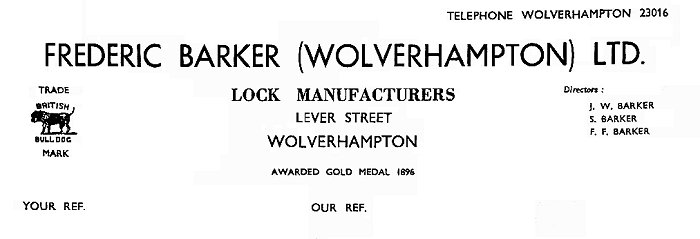
A company letterhead.
| This padlock has the British Bulldog trade mark on the
slide drop. The padlock is described as having a
"string malleable case, side cut shackle, brass bush and
slide drop". There were two lever and four lever
models, with slide drop or swing drop. |
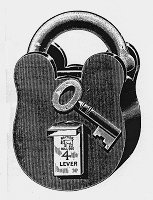 |
WILLIAM BARNES, 52 NORTH STREET, WEDNESFIELD
Key maker. In Kelly’s 1900 there was E J Barnes, North Street
,Wednesfield, key maker. In 1921 there was a James Barnes, key
maker at 36 North Street; and in 1936 at 52 North Street. It is
not known if this was the same family. Not in existence in 1970. Nothing
else known.
BASTA LTD. TUBBERCURRY, CO. SLIGO, IRELAND

|
A company originally set up by the Gallagher
family with support from the Irish Government about 1955 to
provide work on the West coast of Ireland, manufacturing
mortice, rim and cylinder locks. |
The original engineer, John Stenson, was bought in from Scandinavia.
They also developed a die casting division that made door furniture and
window fittings.
They were still making cylinder locks in 1976 but by the 1980s lock
manufacture had virtually ceased, except for a range of 2-lever mortice
lock that used mainly die cast parts. They concentrated on die cast door
furniture and window fittings. Any other locks they did sell were
purchased from other lock makers (e.g. G. ANSLOW (q.v.)).
In 1990 were taken over by a group led by Kevin Norton. At the time
they only had a small range of products. A lot of hard work saw the
range increase.
In 1998 they acquired "Worcester Parsons" who were the leading
British manufacturer and supplier of "upmarket" brass, aluminium, mild
steel and stainless steel extruded hinges, and Basta Parsons was formed.
In 2001 they took over the Wolverhampton Lock making works of Latham
Manufacturing. (See under Gibbons and Co (Willenhall) Ltd)) who
manufacture ‘Conquest’ friction hinges and the Gibbons range of locks.
DAVID BATE, CORN HILL, WOLVERHAMPTON.
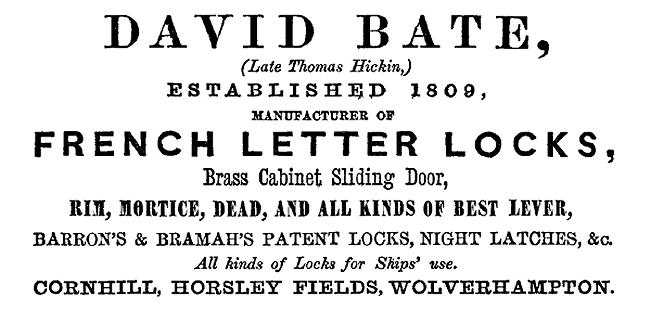
An advert from 1861.
JOSEPH BATES, J & E BATES, 101 LORD STREET, WOLVERHAMPTON.
Read the
history
of Bates |

|
|

|
|

|
| Return to Locks
and Safes |
|
Return to the
list of makers |